Thanks for joining in, Slonda828, and for sharing your experience of the joys of snorkelling. I'm glad too that you understand so well what distinguishes snorkelling from freediving, a distinction which some scuba divers find unfathomable. Your rally-driver metaphor is extremely apt.
Earlier this morning I made another snorkelling trip to the North Sea, about eight miles away from where I live. Slightly coolish summer weather, slightly choppy sea, with just a few dog walkers for company on the beach and the occasional plane in the sky preparing to land at the local airport. There's not much to see underwater, no fish, just bits of seaweed and sometimes a small jellyfish or two on the beach, so I always watch where I put my feet. I spent a very pleasant hour there and have since returned, refreshed, relaxed and exercised.
Like you, I love using vintage, or classic, equipment when I snorkel. I collect not only pre-1975 masks and fins but also basic snorkelling gear still manufactured the old-fashioned way in more than a dozen countries around the world. I don't just display them at home, I use them when I go snorkelling. The gear helps me connect with the early 1960s when I began snorkelling in the UK and later on in continental Europe. When western diving equipment manufacturers decided to move into the oil-based synthetics business in the mid-70s, I decided to stay put as I frankly couldn't see the point of silicone masks when I didn't suffer from allergies, or composite fins languishing inside 1980s dive shop bargain bins, their hard plastic blades slowly delaminating from their sagging thermoplastic elastomer foot pockets. I wondered why people just couldn't leave well alone! Fortunately, there are still plenty of suppliers of old-fashioned gear around the world and what's even better is that such gear costs so much less than their modern counterparts.
Here's a list of the equipment I use when snorkelling:
Mask: always rubber-skirted, oval models, as I don't like the look or feel of low-volume silicone masks. I have several masks and I swam this morning with a Ukrainian-made
Akvanavt. I also enjoy using a blue-skirted
Ixtapa mask, manufactured in Mexico. Both masks are still made today. The
Ixtapa is pictured below:
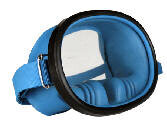 Fins:
Fins: always all-rubber full-foot fins. When I started snorkelling in the 1960s, full-foot fins were always much more expensive than open-heel ones and were the fins of choice for serious European divers. I swam this morning with
Escualo fins made in Mexico, which come with high arches that accommodate my large feet comfortably. I also enjoy swimming with soft and flexible Russian-made
Del'fin fins, which have closed toes as well as closed heels, and stiffer-bladed
Gull Mew fins made in Japan. Once again, all these fins are still in production today:
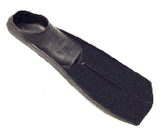
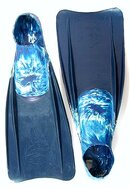
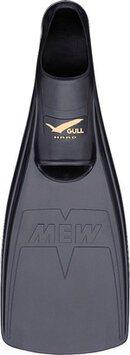 Snorkel:
Snorkel: always a simple J-shaped tube with a rubber mouthpiece. This morning I used a blue
Britmarine snorkel, made in England but no longer in production. I also have a black snorkel, made in Greece.
Suit: The North Sea can be cold and I enjoy snorkelling eight or nine months of the year. Even in the warmest months, I still find I need some thermal protection, otherwise I shiver and the process of entering the water is slow and painful. I rotate three old-fashioned drysuits to keep warm and dry during my hour's snorkelling. This morning I wore a green
Hydroglove suit, to which Slonda828 has already alluded. It's lightweight, simplicity itself, easy to swim in after a little practice with sealing and venting the garment. It admits only a few droplets of water during use and it's relatively inexpensive compared with modern drysuits, which I find over-featured and over-engineered as well. I'm very well aware of the suit's limitations and I avoid many of these anyway because I don't scuba-dive. The other two suits I use regularly are another
Hydroglove - a more recent black version with stronger soles - and a vintage yellow
Skooba-"totes" suit from the late 1950s in fully diveable condition, and like the
Hydrogloves, a waist entry drysuit comprising footed pants and a hooded shirt.
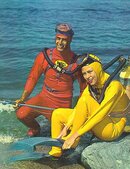
I complete the suit with a pair of black drygloves, bought on eBay, which form a watertight seal against the drysuit's wrist seals.
I'm very happy with this combination of gear, which matches my personal style of relaxed snorkelling as well as helping me to recapture the period when I began my lifelong pastime. However, I'm not going to recommend that everybody now follows my example when choosing snorkelling equipment for themselves. Basic gear selection is a problem-solving process, not a set of instant solutions, which is why I never recommend brands, let alone individual mask or fin models, because what works for me is most unlikely to work for everybody else. Whenever I mention on some forum or other my choice of a Hydroglove to keep myself warm and dry, there's always somebody young and cocksure around, ready with the unsolicited advice that a freediving wetsuit would be a better and safer choice. A good choice for you perhaps, I think, but I'm well past the stage in my life when I feel that I have to justify everything I do or believe I have the monopoly of wisdom! We're all different, and the world's a better place for our diversity.









